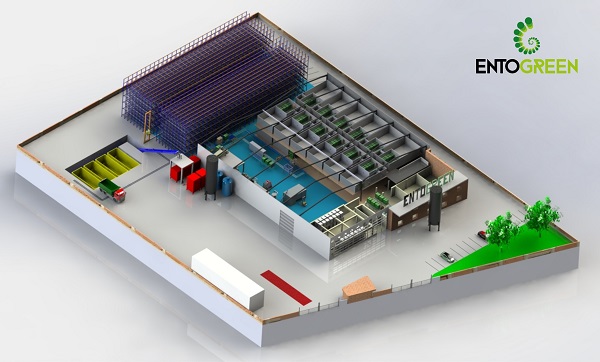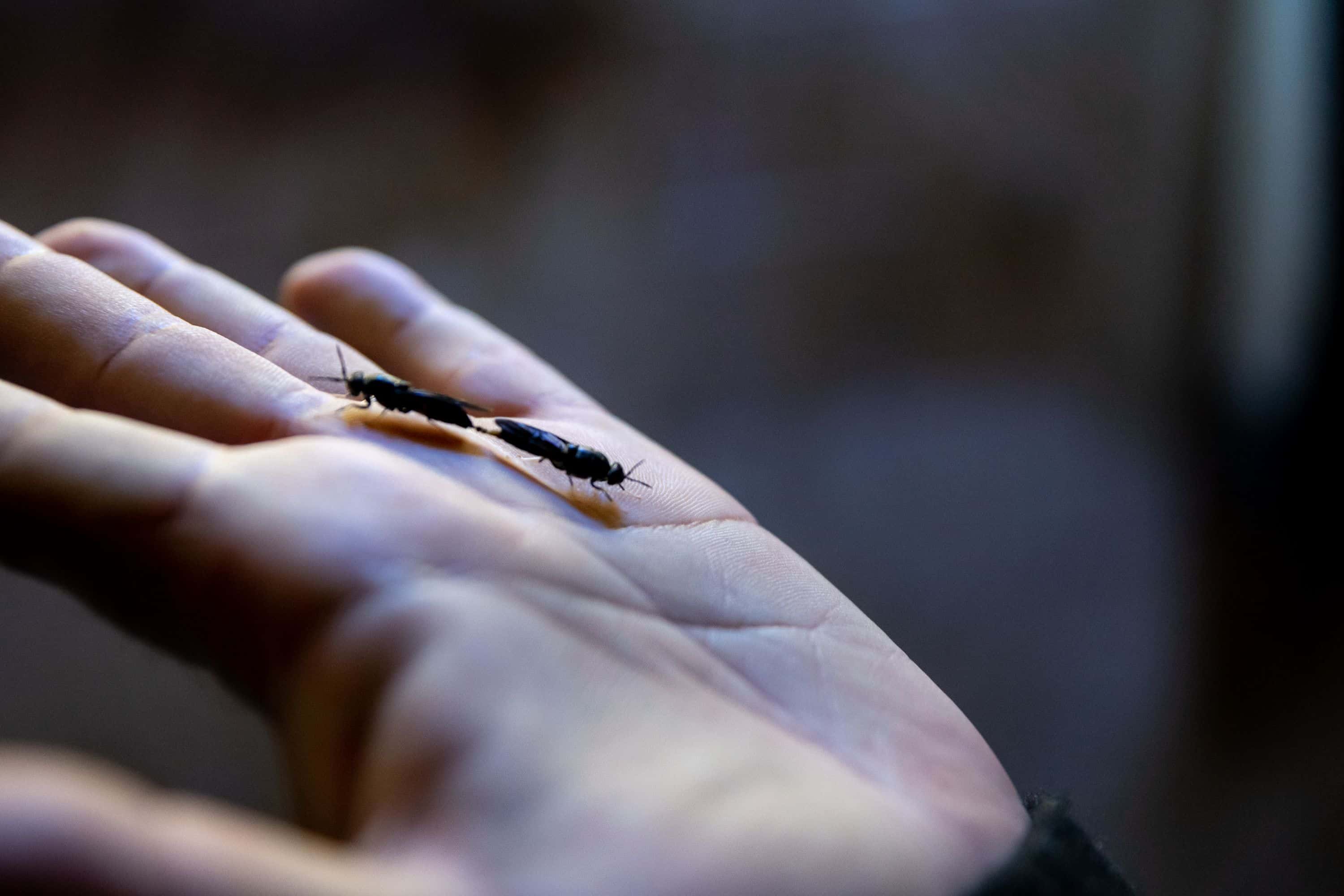Share


200.000 €
Settled by the promoter
EntoGreen IV
Santarém, PT
instalment
monthly
term
6 months
a year
5.75%
rating
C+
Use of insects in wastewater treatment and enhancement.
Description
A EntoGreen, uma marca da Ingredient Odyssey (IO), focada na economia circular no setor agroalimentar, alcançou um investimento que lhe permitirá construir a primeira unidade industrial de bioconversão com insetos. A empresa sediada em Santarém vai recorrer a insetos para obter proteína para ração animal, fertilizantes não químicos e óleo de insetos a partir de desperdícios vegetais.

Esta é a quarta campanha Goparity promovida pela EntoGreen, depois de angariar 500.000€ através da comunidade de investimento de impacto (EntoGreen I, II e III). As primeiras campanhas tiveram como principal objetivo:
- adquirir um robot que permite realizar o processo de inoculação de forma automatizada e com enormes ganhos de produtividade, eliminação a possibilidade de erro humano e contribuindo de forma significativa para a eficiência energética do processo.
- investimentos industriais finais relativos à instalação e montagem da unidade industrial em Santarém.
- apoiará também a empresa no seu plano geral de I&D que engloba um investimento estimado em 5 milhões de euros entre 2021 e 2026 para novos projetos de investigação que incidem na criação de novas soluções de sustentabilidade ambiental.
Esta campanha visa a antecipação de fundos que a empresa receberá de um projeto europeu de cerca de 400 mil euros no âmbito do projeto de I&D Empresarial NETA - Novas Estratégias de Tratamento de Águas Residuais.
O desenvolvimento do projeto NETA visa criar uma nova solução técnica que permite transformar uma ameaça ambiental, as águas residuais e efluentes, numa fonte de nutrientes e recursos hídricos. Uma solução que vai da rega, à produção de fertilizantes e até mesmo à criação de novas soluções bioindustriais.
Liderado pela Ingredient Odyssey SA (EntoGreen), o projeto NETA pretende optimizar e utilizar a Técnica de Precipitação Química, que foi desenvolvida pelo Instituto Politécnico de Beja (IPBeja), no tratamento de águas residuais, utilizando a água tratada para fins agrícolas, sendo as lamas biodigeridas por insetos, nomeadamente larvas de mosca soldado negro (Hermetia illucens).
A Estação Zootécnica Nacional (Instituto Nacional de Investigação Agrária e Veterinária – INIAV), no Vale de Santarém, está a ser a base dos processos em desenvolvimento, sendo um dos objetivos tornar este projeto num exemplo em circularidade da água. Enquanto a água é usada em processos que vão da rega à aquaponia, as lamas são tratadas por insetos, transformando-as em fertilizantes estáveis, sem cheiro e prontos a serem usados nos terrenos agrícolas. Estes novos fertilizantes já se encontram a ser testados em campos de demonstração.
Tanto as águas tratadas, como as lamas e fertilizantes serão avaliados ecotoxicologicamente pela Univ. de Aveiro e IPBeja. As larvas de inseto utilizadas no tratamento das lamas estão a ser utilizadas em processos de biorefinaria, como a extração de óleo para biocombustíveis, cosméticos e outros usos químicos, e a quitina está a ser usada para transformação em quitosano e posterior uso na criação de bioplásticos. À semelhança do que já aconteceu no passado, a EntoGreen pretende levar este projeto do desenvolvimento de base laboratorial até à sua aplicação industrial, tornando este projeto numa mais valia empresarial e ambiental.

The Impact
Direct
- Promotion of innovation and research: the investment in research in the development of innovative solutions for cleaner and more sustainable agriculture and animal feed. The association with universities also allows for the transfer of knowledge and technology in the future. These collaborative relationships can highlight Portugal in the industry of using insects as a scalable sustainable solution.
- Reuse of wastewater and promotion of circularity: after the waste water treatment, the sludge is treated by insects, transforming it into stable, odorless fertilizers ready to be used on farmland. The insect larvae used in the sludge treatment are being used in biorefinery processes, such as oil extraction for biofuels, cosmetics, and other chemical uses, and the chitin is being used for transformation into chitosan and subsequent use in the creation of bioplastics. The wastewater disposal is an environmental threat, and this wholesome solution enables a sustainable reuse of the waste and its nutrients in a circular economy perspective.
Contribution to the Sustainable
Development Goals
Sustainable Development Goals
.e392164.png)
.b54aa7b.png)
.628b215.png)
Financial viability
This campaign aims to anticipate funds that the company will receive from a European project of around 400 thousand euros.
Download Key Investment Information Sheet
The Promoter
About Ingredient Odyssey SA

Ingredient Odyssey, SA (IO) was founded on March 4, 2014 by Daniel Murta, who is the CEO and head of R&D at IO. It was during his PhD that he saw in insects the opportunity to contribute to sustainability in food production, developing protein alternatives and new nutritional sources for human and animal food, based on insects.
One of the first partnerships emerged with the National Institute for Agricultural and Veterinary Research (INIAV) in 2013, a core partner of the EntoGreen project.
The first project submitted jointly with the institute focused on alternative protein sources for animal feed (Genetics and nutrition and alternative feed resources for terrestrial livestock production, SFS-01a-2014) and was submitted in early 2014 under a Horizon 2020 application led by the University of Milan and involving several entities from different countries, inside and outside the European Community.
Currently, IO and INIAV continue with the development of the project having simultaneously investigated the creation of solutions for plant by-products, bringing the circular economy to the agri-food sector.
In September 2015, Rui Nunes joined the corporate structure of Ingredient Odyssey, as he also worked with insects.
To this day EntoGreen continues to develop work in the area and has started the construction of a bioindustrial unit in which it will be possible to convert 36,000 tonnes of plant by-products into thousands of tonnes of final products.
However, the role of R&D in the history of IO does not end with the implementation of the first bioindustrial unit the company intends to continue researching and developing new projects with innovative biotechnologies, hoping to leave its mark on environmental sustainability in Portugal and the world.
The company has already concluded and inaugurated EntoGreen's new R&D Unit, which is fully operational and will be a fundamental tool for further improving processes and adding value to the final products. The Santarém Industrial Unit is expected to start production in the last quarter of this year (2022).
Business Model
EntoGreen's Business Model consists in the sustainable industrial production of animal protein and organic fertilizer from the use of vegetable by-products that today represent a problem for the agri-food industries, through a biotechnological process, whose protagonist is the black soldier fly.
EntoGreen's environmental commitment consists in bringing the circular economy to the agri-food sector and is based on offering a complete range of 100% Ecological and Sustainable Production products, in the search for a fair balance between Man and Nature.
Active since
2014
Fiscal country
PT
Operating In
Portugal
Industry
I&D
Number of Goparity Loans
5
Women Shareholders
No
Website
https://www.entogreen.com/Updates
2023-08-10
Project End
This project has successfully reached its payments plan maturity. All investors have received their full capital invested and interest. Nevertheless, its impact will keep growing for many more years!
2023-03-08
First payment
First instalment was paid to all the investors
2023-02-03
100% funded
926 investors successfully raised 200.000€
2023-02-03
100% funded
926 investors successfully raised 200.000€
2023-01-27
Open for investment
This campaign is open for investment
Sign up to our newsletter and stay up-to-date on our investment opportunities






